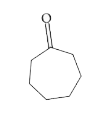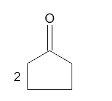Reductive Ozonolysis of  will give
will give




Step by step video & image solution for Reductive Ozonolysis of will give by Chemistry experts to help you in doubts & scoring excellent marks in Class 12 exams.
Updated on:21/07/2023Similar Questions
Knowledge Check
Which of the folllowing on reductive ozonolysis will give only glyoxal?
AetheneBBenzeneCtolueneDEthyneWhich of the folllowing on reductive ozonolysis will give only glyoxal?
AEthaneBBenzeneCtolueneDAcetyleneAlkenes undergo a variety of oxidation reactions. With cold and neutral or alkaline KMnO4, alkenes are oxidised to give vicinal diols. Oxidation with hot KMnO4 undergoes cleavage of C=C bond leading to the formation of carboxylic acids, ketones and carbon dioxide depending on the nature ofalkene. Reductive ozonolysis of alkenes give aldehydes or ketones.
Reductive ozonolysis of alkene 'A' gives propanone. The alkene 'A' isA2,3,-Dimethylbut-2-eneB1,4-Dimethylpent-2-eneC1,3-Dimethylbut-2-eneD2-Methylpropene
How many of the following on reductive ozonolysis will give ethanal as one of the products?
2-Methylbut-2-ene, 2-methylpropene, but-2-ene, propene, ethene, pent-2-ene, pent-3-ene, hex-3-ene
View SolutionHow many of the following on reductive ozonolysis will give only glyoxal? Ethylene, acetylene, 1,3-butadiene, benzene, o-xylene, m-xylene, p-xylene, cyclobutadiene, cyclooctatetrene.
View SolutionHow many of the following on reductive ozonolysis will give only glyoxal? Ethylene, acetylene, 1,3-butadiene, benzene, o-xylene, m-xylene, p-xylene, cyclobutadiene, cyclooctatetrene.
View SolutionAlkenes undergo a variety of oxidation reactions. With cold and neutral or alkaline KMnO4, alkenes are oxidised to give vicinal diols. Oxidation with hot KMnO4 undergoes cleavage of C=C bond leading to the formation of carboxylic acids, ketones and carbon dioxide depending on the nature ofalkene. Reductive ozonolysis of alkenes give aldehydes or ketones.
But-2-ene on treatment with cold alk. KMnO4 gives
View SolutionAlkenes undergo a variety of oxidation reactions. With cold and neutral or alkaline KMnO4, alkenes are oxidised to give vicinal diols. Oxidation with hot KMnO4 undergoes cleavage of C=C bond leading to the formation of carboxylic acids, ketones and carbon dioxide depending on the nature ofalkene. Reductive ozonolysis of alkenes give aldehydes or ketones.
An alkene 'X' on treatment with hot alkaline KMnO4 gives acetic acid. Alkene X' is
View Solution
